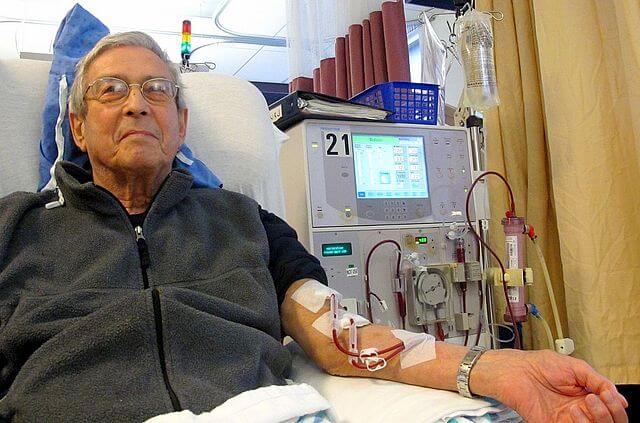Receiving dialysis at home while sleeping not only improves kidney health and quality of life for people with kidney disease, it could also decrease their risk of heart disease, says new study presented at the Canadian Cardiovascular Congress.
“Patients with end-stage renal disease have at least a five-fold increase in cardiovascular complications,” says Dr. Christopher Overgaard, one of the study’s authors and a cardiologist at the Toronto General Hospital. “Longer dialysis, done while patients are sleeping, may improve the health of arteries and could lower the risk of developing heart disease.”
The study found that after patients transitioned to overnight dialysis, there were improvements in coronary artery function.
Because of the frequency and duration of overnight dialysis, toxins are more evenly and gently removed from the blood. “Increasing the number of hours patients receive their treatment results in less toxin buildup in their blood for shorter durations,” says Dr. Overgaard.
Impaired endothelial function – a condition that reduces blood vessel’s ability to dilate – puts kidney patients at a significantly higher risk for the development of atherosclerosis (the buildup of fat in the walls of arteries). Atherosclerosis, in turn, can eventually lead to serious problems including heart attacks, stroke or even death.
Conventional hemodialysis in a clinic typically involves dialysis three times a week, for three to four hours at a time – upwards of 12 hours a week.
Contrast that with what’s called overnight “home” hemodialysis, done while patients sleep at home. This method allows dialysis six times a week, for up to 12 hours at a time, for up to 72 hours.
Beyond the clinical benefits, patients on overnight dialysis no longer have to revolve much of their schedule around clinic trips.
“This method also improves quality of life by having the dialysis in the comfort of your home, while sleeping, instead of being stuck in a dialysis unit for hours,” says Dr. Overgaard. “Old-fashioned dialysis is stressful.”
A dialysis machine functions as a kidney for people whose kidneys aren’t functioning properly; in essence, cleaning their blood.
“This could be revolutionary for kidney patients,” says Dr. Beth Abramson, Heart and Stroke Foundation spokesperson. “A simple change in the way we deliver care can make a significant difference. In addition to benefits to kidney function and quality of life, it could lower their risk of heart disease.”
She adds that high blood pressure and diabetes are two common causes of kidney disease and all Canadians should be mindful of reducing these risks.
The Canadian Cardiovascular Congress is co-hosted by the Heart and Stroke Foundation and the Canadian Cardiovascular Society.


